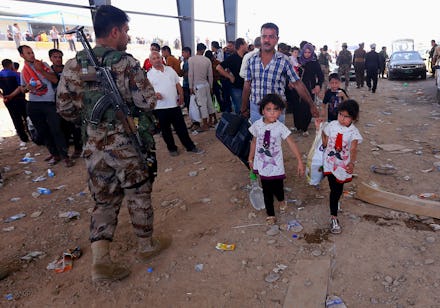Even Al-Qaida Thinks What Just Happened in Iraq Is Bad News

The news: The Iraqi government was dealt another blow when a massive force of insurgents overran the northern city of Mosul. On Tuesday, militants seized control of the airport, TV stations and the governor's offices as soldiers and police alike dropped their weapons and fled their posts.
For all intents and purposes, the second-largest city in Iraq is now under the control of the Islamic State in Iraq and Syria (ISIS), an extremist group with such an awful track record of violence that it was officially disavowed by al-Qaida. Hundreds died in the fighting, and tens of thousands of civilians and government personnel fled the city carrying only whatever they could fit in bags.
Inside the city, defenders lost control of security checkpoints, military bases and a prison where ISIS insurgents freed some 1,000 detainees. About 500,000 people may be displaced.
Reuters reports a total rout of the defenders and that security personnel were seen changing out of their uniforms to avoid execution. The bodies of soldiers and policemen lay unattended in the streets, some mutilated. An ISIS Twitter account claimed that large stockpiles of munitions, equipment and arms had been seized from government armories.
"Army and police forces left their positions and ISIL terrorists are in full control," one colonel told Reuters. Another said "[W]e can't beat them. We can't. They are well trained in street fighting and we're not. ... They're like ghosts: They appear, strike and disappear in seconds." One civilian simply said that "Mosul is now like hell." Iraqi Prime Minister Nouri al-Maliki apparently has realized his security forces are insufficient to fight back against ISIS, and took to the airwaves to encourage every available man to fight, promising arms and equipment.
Image Credit: AP
A rocky situation: This massive defeat not only raises unavoidable questions about the long-term stability of al-Maliki's government, it suggests that without major changes there will not be one at all. Arming and training the Iraqi security forces now means that U.S.-supplied weapons and military vehicles are in insurgent hands.
"Everything is fallen. It's a crisis. Having these terrorist groups control a city in the heart of Iraq threatens not only Iraq but the entire region," Iraq's speaker of parliament, Osama al-Nujaifi, said during a televised news conference in Baghdad. "This will reach every corner of Iraq if it doesn't stop. We need a fast reaction to stop this terrorism."
Action in Mosul has heated up partially because it lies less than 100 miles from Syria, where ISIS rebels control vast swathes of the country amidst a ruinous civil war. Now that Mosul is in ISIS hands, the organization could potentially control a united front running between the two nations. According to Al-Jazeera, the group now holds three provinces bordering Syria, allowing for "unhindered movement of weapons and fighters."
Why you should care: Aside from remembering this the next time an American president proposes invading and destabilizing another country, this is bad news for the entire region.
The ISIS now is waging insurgencies against two governments, and while it may not necessarily be able to defeat either, it has shown determination and organization well beyond its origins as a mere al-Qaida affiliate. As scary as it sounds, the ISIS may be very much on its way to replacing al-Qaida as the preeminent Islamic extremist group of the times.